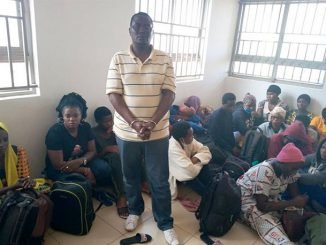
Kampala, Uganda | By Michael Wandati | The High Court Civil Division, presided over by Justice Boniface Wamala, has awarded a compensation of Shs 250 million to the family of Milly Namutamba, a Ugandan maid who tragically died in Saudi Arabia in 2019.
The lawsuit was brought forward by Namutamba’s daughter, Namale Desire, and her uncle, Muyingo Mutasa Charles, against Horeb Services Uganda Limited, the recruitment agency responsible for Namutamba’s placement abroad, and its director Ezra Mugisha.
Namale, represented by legal aid lawyers from The Women’s Pro Bono Initiative, narrated to the court that her mother had been recruited as a domestic worker and sent to Saudi Arabia on August 19th, 2018. Prior to her departure, Namutamba was in good health and had undergone a mandatory medical check-up to ensure she was fit for work.
While working in Saudi Arabia, Namutamba maintained regular communication with her family until the contact suddenly stopped. Concerned for her mother’s well-being, Namale reported the issue to Horeb Services and continued to visit their offices for almost two years, hoping for answers. However, the company remained unresponsive, providing little to no information about Namutamba’s status.
It was not until September 2022, years after the disappearance, that Namale was finally informed of her mother’s death and that she had been buried in an undisclosed location in Saudi Arabia, making it impossible to repatriate her body to Uganda. The family had also been promised compensation, which they never received.
In his defense, Horeb Services’ director, Ezra Mugisha, claimed that his company was not responsible for Namutamba’s death, arguing that they had partnered with Al Manasa Recruitment Agency, a Saudi-based company, which was responsible for Namutamba’s employment and welfare. He suggested that any claims should be directed toward the Saudi company, not Horeb Services.
However, Justice Wamala ruled in favor of Namale’s family, stating that Namutamba had no direct connection with the Saudi company and, therefore, could not seek legal action against them. He emphasized that it was Horeb Services Uganda Limited, licensed by the Ugandan government through the Ministry of Gender, Labour and Social Development, that bore the responsibility for Namutamba’s recruitment and welfare. The court ruled that the recruitment company failed in its duty to protect Namutamba and ensure her well-being during her employment abroad.
As a result, Justice Wamala ordered the company to compensate Namutamba’s family with Shs 250 million for their loss, marking a significant legal victory for Ugandan families seeking justice for relatives who have suffered or died while working abroad.
“It is clear to me that the responsibility of the respondents about the externalization of Milly Namutamba arose out of the licence issued to the 1st respondent under the said regulations. The existence of a bilateral agreement between the States of Uganda and Saudi Arabia or the contract referred to above did not extinguish the responsibility of the 1st respondent as a recruitment agency which contracted with the Saudi Arabian recruitment agency for the externalisation of the deceased worker.
Although the 1st respondent attempted to distance themselves from responsibility over the safety and welfare of the deceased migrant worker, the facts and the law reveal otherwise,” the Judge ruled.
“It is wrong on the part of the respondents to argue that the responsibility over Namutamba Milly lay against the other stakeholders and not on themselves. The legal framework indicates that the 1st respondent bore the primary responsibility for the safety and life of the deceased migrant worker. The 1st respondent was also the entity vested with locus to enforce against any breach of the agreed terms against either the foreign recruitment agency or the Kingdom of Saudi Arabia,” the ruling adds.
The compensation was broken down into Shs 200 million in general damages for the family’s loss and Shs 50 million in exemplary damages, to serve as a punishment for the recruitment company’s failure to act responsibly.
In addition to the financial compensation, the court also awarded the applicants the costs of the suit, further holding Horeb Services accountable for their negligence in handling the case.
Also Read: Ugandan housemaid ends life after Saudi Arabia employment, employer speaks out
“Having found that the respondents violated the late Milly Namutamba’s right to life, it follows that the applicants are entitled to damages owing to the wrongful acts of the respondents… The applicants showed evidence that they suffered from mental anguish, inconveniences, grief and pain while trying to find out the whereabouts of the deceased.
They further suffered mental and psychological pain upon learning that their family member had fallen sick, died and was buried in Saudi Arabia, without the consent or consultation with the family members in Uganda. The situation is aggravated by the fact that the place of burial of the deceased was not known or identified,” the ruling reads.
This court ruling is likely to open floodgates of suits against recruitment companies. Many Uganda maids and other casual workers have died particularly in the Middle East, and recruitment companies that recommended them there have deflected responsibility.



